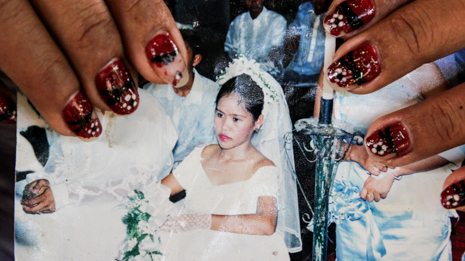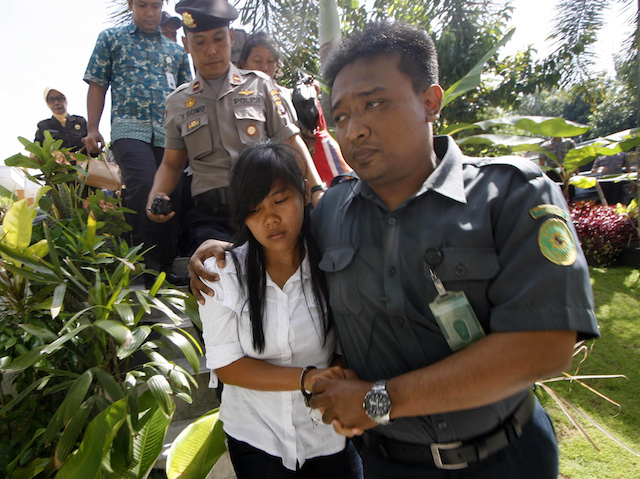JAKARTA, Indonesia – The Philippine government is scrambling to save the life of former overseas Filipino worker Mary Jane Fiesta Veloso, a 30-year-old mother of two sentenced to be executed by firing squad in Indonesia.
Mary Jane was arrested, tried and sentenced to death in 2010 for attempting to smuggle 2.6 kilograms of heroin into Indonesia. But she only began making headlines in Indonesia in January, after Indonesian President Joko “Jokowi” Widodo rejected her request for clemency.
Shortly after that, the Attorney General’s Office announced that the next batch of executions would include a Philippine citizen. Veloso is the only Filipino on Indonesia’s death row.
Based on interviews with Mary Jane’s lawyers and family members as well as Philippine government officials, this is what we know so far:
Who is Mary Jane?
A wedding photo of Mary Jane Veloso, who was only 17 years old when she got married. The marriage has since been nullified because she was a minor. Her husband has already remarried. Photo by Joe Torres/UCA News
Mary Jane was born to a poor family in Nueva Ecija, the youngest of 5 children. She only made it to the first year high school, married early, and had two children not long after. The marriage didn’t last long, though, and she and her husband separated. (READ:
A slow death for family of Filipina on Indonesia's death row)
According to Agus Salim, her Indonesian lawyer, she found work in Dubai as a domestic helper. However, she returned to Manila before her two-year contract ended because “she was almost raped”.
How did she end up with a suitcase full of heroin?
In early 2010, Agus said Mary Jane was offered another job as a domestic helper in Kuala Lumpur by a godsister identified only as Christine or Cristina. But when she arrived in Kuala Lumpur, the job was no longer available.
Christine then asked Mary Jane to go to Yogyakarta in Indonesia instead. Agus said Christine gave Mary Jane a brand new suitcase to use plus $500. Mary Jane told her lawyers the suitcase seemed heavy but was empty.
On April 25, 2010, she arrived at Yogyakarta's Adisucipto airport via an AirAsia flight from Kuala Lumpur. When the suitcase passed through the X-ray scanner, it set off the alarm. Indonesian authorities then found packs of heroin wrapped in aluminium foil weighing a total of 2.6 kilograms hidden inside the lining of the suitcase. They later estimated the drugs to have a street value of $500,000.
Why was she sentenced to death?
Indonesia, which has some of the toughest anti-drug laws in the world, categorizes drug-related offenses as extraordinary crimes that deserve the death penalty. For the Indonesian authorities who arrested Mary Jane, the case was simple: A woman was caught trying to enter Indonesia with 2.6 kilograms of heroin hidden insider her suitcase.
But according to Agus, Mary Jane wasn’t able to defend herself well. First, they said she was not given a lawyer or translator when the police were interrogating her in Bahasa Indonesia, which she did not understand at the time.
Then during her trial, the court-provided interpreter – a student at a foreign language school in Yogyakarta who was not licensed by the Association of Indonesian Translators – translated the proceedings from Bahasa Indonesia to English, which Mary Jane was not fluent in.
And third, her lawyer at the time was a public defender provided by the police.
As the brief trial came to a close in October 2010 – just 6 months after she was arrested –prosecutors asked the court to sentence Mary Jane to life imprisonment. But the judges handed down the death penalty.
TIGHT SECURITY. Mary Jane escorted by Indonesian officers during an appeal hearing in Yogyakarta on March 3, 2015. Photo by Bimo Satrio/EPA
What is the government doing to help her?
In August 2011, President Benigno S. Aquino III submitted an appeal for clemency on behalf of Mary Jane to then President Susilo Bambang Yudhoyono. At the time, Indonesia had a moratorium on executions and the clemency request was not acted upon.
In October 2014, the new Indonesian president, Jokowi, was sworn in. Shortly after, he announced that Indonesia’s illegal drug situation was in a state of emergency with 50 Indonesians dying every day because of it, and that he would reject all the clemency requests from drug convicts on death row.
In January 2015, Jokowi rejected a batch of clemency appeals that included Mary Jane’s.
Lawyers hired by the Philippine government quickly filed a request for a judicial review or case review. This is normally the last legal avenue of appeal in the Indonesian justice system but requires that new evidence is presented.
On February 9, Aquino raised Mary Jane’s case with Jokowi, who was on his first state visit to the Philippines. Later that same month, on February 19-21, the government also helped Mary Jane’s mother, sister and two children visit her in jail in Yogyakarta.
What happened to her appeal?
On March 3 to 4, a two-day trial was held in Sleman to determine whether there was new evidence in Mary Jane’s case.
Lawyers argued she deserved a case review because she wasn’t given a capable translator. The head of the foreign language school in Yogyakarta testified that the translator at the time was indeed their student.
Veloso's lawyers also pointed to precedent: In 2007, the Supreme Court granted the case review request of Thai national Nonthanam M. Saichon, who was sentenced to death by the Tangerang District Court in 2002 for smuggling 600 grams of heroin, because of the same translator issue. Her sentence was commuted to life imprisonment.
Agus pointed out in court that Saichon knew what she was doing because the drugs were hidden in her underwear and she tested positive for drugs. On the other hand, Mary Jane's drug test was negative and she maintains she did not know the suitcase contained drugs.
Why didn’t the family report ‘Christine’ to the authorities?
Mary Jane's family said the recruiter, Christine or Cristina, still lived in the same area they do in Cabanatuan. However, they say Christine had warned them not to speak with the media, not to turn anywhere or to anyone, because they are an international syndicate. She warned that they could be murdered one by one if they spoke with anyone. A neighbor told Rappler Christine left her house with some luggage on Sunday night, March 29. (READ:
Fearing for their lives, Velosos seek gov't protection)
What's the next step?
Mary Jane's lawyers are still studying the next legal options available. Two Australians on Indonesia's death row, Andrew Chan and Myuran Sukumaran, whose clemency and case review requests have also been rejected, are taking the
unusual step of challenging Jokowi's rejection of their clemency in court. Their lawyers argue that Jokowi should consider the merits of each case individually, and not simply reject all clemency requests from drug convicts because of the drug situation.
– Rappler.com.x x x."

